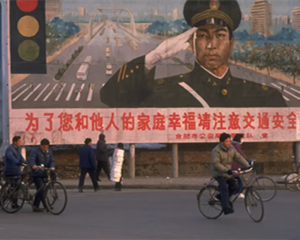My grandparents, by whom I mean my yeye (yeye: my father's father) and nainai (nainai: my father's mother) lived in Hefei, in Anhui province. Hefei is a sleepy, midsize city, overshadowed by Nanjing to the east and Wuhan to the west. For tourists, it's most likely a stopover on the way to the famous Yellow Mountain to the south. Growing up, my brother and I had regularly spent long summer holidays at my grandparents' apartment there, sharing beds with aunts and cousins, splaying out in front of the air conditioners, walking to the internet cafe to play Starcraft and virtual pet games, getting spiced beef jerky and Calbee shrimp chips from the nearby shop and watching soapy Chinese dramas in the evening. To get to the apartment, we buzzed in through a heavy front door and stomped up three floors of cold concrete steps. Outside the building, there was a mulberry tree; occasionally, my grandmother would use the leaves to raise silkworms.
我的祖父母,也就是我的爺爺(我父親的父親)和我的奶奶(我父親的母親)住在安徽合肥。合肥是一座安逸的中型城市,東臨南京,西臨武漢。對游客來說,它很可能會是去往著名的黃山途中的一個中轉(zhuǎn)站。在我成長的過程中,哥哥和我經(jīng)常在祖父母的公寓里度過漫長的暑假,和阿姨、表兄弟們同睡一張床,在空調(diào)前躺著,去網(wǎng)吧玩星際爭霸和虛擬寵物游戲,在附近的商店買五香牛肉干和卡樂比蝦片,晚上看中國肥皂劇。為了去到公寓,我們要嗡嗡地從一扇沉重的前門進去,踏著冰冷的水泥臺階爬三層樓。公寓外有一棵桑葚樹,奶奶偶爾也會用這些葉子養(yǎng)蠶。
The rest of the time, we were in California. Since I wasn't physically with my family in China, WeChat, the ubiquitous social media app for Chinese speakers, became the portal through which I could peer to the other side. Our WeChat group is a repository of baby photos, funny videos and chatter between all the relatives. When I scroll far up, there are holiday photos, old conversations between my aunts about my grandparents' health, small squabbles and gossip about their daily lives.
其余的時間我們都在加州。由于我沒有和中國的家人住在一起,無處不在的中文社交媒體應(yīng)用“微信”成為了我可以窺視世界另一面的門戶。我們的微信小組是一個儲存嬰兒照片、有趣視頻和所有親戚之間聊天的資料庫。當我向上刷朋友圈時,我看到的是假期的照片、阿姨們關(guān)于祖父母身體的舊的聊天記錄、小爭吵以及他們?nèi)粘I畹陌素浴?/p>

"At six o'clock this morning, the old princess said she was hungry, and she got up to eat," they would write of my grandmother. "Good thing the caretaker knows her rules by now."
“今天早上六點鐘老夫人就喊餓了,立馬就要起來吃飯,”他們在說我的祖母。“好在保姆現(xiàn)在知道她的習慣了。”
"No gas at my house this morning, but luckily I got a dinner invitation from my friend. I brought over strawberries and pickled clover from Chongming Island," one aunt wrote, sending pictures.
“今天早上我家沒油了,不過很幸運,朋友讓我去他家吃晚飯。我從崇明島帶了草莓和腌制的三葉草,”一位阿姨寫道,還發(fā)來了照片。
"I like Song Joong-Ki," a female cousin wrote of a famous pretty boy actor during a conversation about Korean celebrities, and another aunt, 30 years her senior, gravely affirmed, "I also like Song Joong-Ki", to my cousin's amusement.
“我喜歡宋仲基,”一位堂姐在談?wù)擁n國名人時這樣說道,另一位年長她30歲的阿姨一臉嚴肅地說道,“我也喜歡宋仲基。”
My grandmother, who could read WeChat but never figured out how to type, occasionally entered nonsense letters as she scrolled through. My father would always reply, "Poor Mama. What are you trying to say?"
我的祖母能看懂微信上的聊天,但不太會打字,她在刷屏幕時偶爾會輸入一些毫無意義的字母。父親總是這樣說:“可憐的媽媽。你想說啥呢?”
At my grandmother and my grandfather's funerals, WeChat was the technology that let us be present at those ceremonies in real time. But it is an imperfect portal: one cannot truly be back. We couldn't put flowers on the bodies; we couldn't, as our relatives in China did, go back to the apartment afterwards and lay oranges by my grandparents' photos. How alienating it was, to be sending our spirits through our screens – rectangles the size of our hands. My grandparents' deaths still do not feel real. Not really. They were already so far away. My grandmother is still listed in my WeChat contacts, a name that, when I scroll through my phone, makes me startle.
在祖母和祖父的葬禮上,微信是一項能夠讓我們實時出席那些儀式的技術(shù)。但它并不是一個完美的入口:因為一個人不可能真的回來。我們不能在尸體上放花,我們不能像我們在中國的親戚那樣,事后回到公寓,在祖父母的照片旁邊放上橘子。通過手掌大小的長方形屏幕表達我們的心情,這是多么的疏遠啊。祖父母的去世對我來說還是那么地不真實。這不是真的。但他們已經(jīng)離我很遠了。我的祖母還在我微信的聯(lián)系人列表中,我在刷手機看到祖母時會嚇一大跳。












